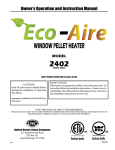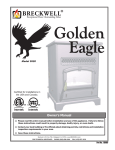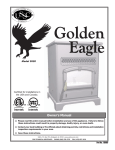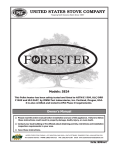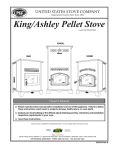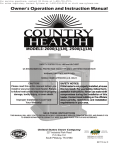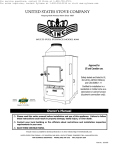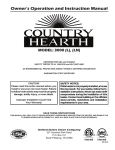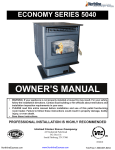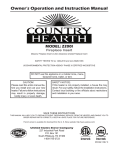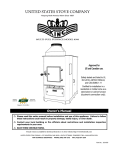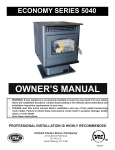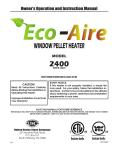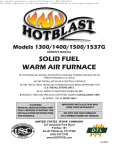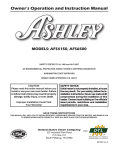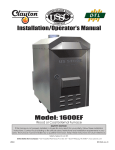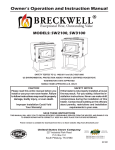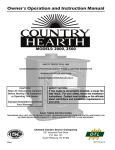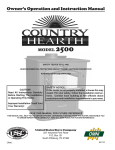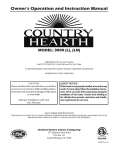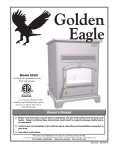Download United States Stove Company BRECKWELL SPG9000 Instruction manual
Transcript
Owner’s Operation and Instruction Manual BRECKWELL® Exceptional Heat, Outstanding Value MODELS: SPG9000 PATENT PENDING CAUTION! Please read this entire manual before you install or use your new room heater. Failure to follow instructions may result in property damage, bodily injury, or even death. Improper Installation Could Void Your Warranty! SAFETY NOTICE: If this heater is not properly installed, a house fire may result. For your safety, follow the installation instructions. Never use make-shift compromises during the installation of this heater. Contact local building or fire officials about permits, restrictions and installation requirements in your area. SAVE THESE INSTRUCTIONS STATES ST OV TED NI USSC COMPANY E U THIS MANUAL WILL HELP YOU TO OBTAIN EFFICIENT, DEPENDABLE SERVICE FROM THE HEATER, AND ENABLE YOU TO ORDER REPAIR PARTS CORRECTLY. KEEP IN A SAFE PLACE FOR FUTURE REFERENCE. United States Stove Company 227 Industrial Park Road P.O. Box 151 South Pittsburg, TN 37380 852016 CONGRATULATIONS! You’ve purchased a heater from North America’s oldest manufacturer of wood burning products. By heating with wood pellets, you’re helping to CONSERVE ENERGY! Wood is our only Renewable Energy Resource. Please do your part to preserve our wood supply. Plant at least one tree each year. Future generations will thank you. The instructions pertaining to the installation of your pellet heater comply with UL 1482 standards. Combustible : Hardwood Pellets Colors : Black Flue Pipe Diameter : 6” (152.5mm) Flue Pipe Type: (Standard Single Wall or Double Wall): Black or Blued Steel 2100°F (650°C) Minimum Chimney Hieght : 12’ (3.7m) Dimensions Overall : Depth x Width x Height : 25” x 23 1/2” x 43” (635mm x 596.9mm x 1092.2mm) Door Opening : Width x Height: 22” x 19 /2” (558.8mm x 495.3mm) 7 12 /8” x 10 1/4” (327mm x 5410.2mm) 1 Pyroceramic Glass Door : (Viewing) Width x Height: FUEL CONSIDERATIONS Your pellet stove is designed to burn premium hardwood pellets that comply with Association of Pellet Fuel Industries standards. (Minimum of 40 lbs density per cubic ft, 1/4” to 5/16” diameter, length no greater than 1.5”, not less than 8,200 BTU/lb, moisture under 8% by weight, ash under 1% by weight, and salt under 300 parts per million). Pellets that are soft, contain excessive amounts of loose sawdust, have been, or are wet, will result in reduced performance. Store your pellets in a dry place. DO NOT store the fuel within the installation clearances of the unit or within the space required for refueling and ash removal. Doing so could result in a house fire. OPTIONAL ACCESSORIES DESCRIPTION PART # 150 CFM Blower Assembly SPGB Louver Set - Stainless Steel SPGLS CAUTIONS: • HOT WHILE IN OPERATION. KEEP CHILDREN, CLOTHING AND FURNITURE AWAY. CONTACT MAY CAUSE SKIN BURNS. • DO NOT USE CHEMICALS OR FLUIDS TO IGNITE THE FIRE. • DO NOT BURN GARBAGE, FLAMMABLE FLUID SUCH AS GASOLINE, NAPHTHA OR MOTOR OIL. • DO NOT CONNECT TO ANY AIR DISTRIBUTION DUCT OR SYSTEM. • ALWAYS CLOSE THE DOOR AFTER THE IGNITION. NEVER OPERATE HEATER WITH DOOR LEFT OPEN (AJAR). 2Ussc CUT HERE " WARRANTY INFORMATION CARD Name__________________________________________ Telephone #: (_____)_____________ City____________________________________________ State_______ Zip_________________ Email Address __________________________________________________________________ Model # of Unit________________________________ Serial #___________________________ Fuel Type: qWood qCoal qPellet qGas qOther _________________________ Place of Purchase (Retailer)______________________________________________________ City____________________________________________ State_______ Zip_________________ If internet purchase, please list website address___________________________________ Date of Purchase _______________________________________________________________ Reason for Purchase: qDecoration qAlternative Heat qCost qMain Heat Source qOther _________________________ What was the determining factor for purchasing your new appliance?_______ I have read the owner’s manual that accompanies this unit and fully understand the: Installation q Operation q and Maintenance q of my new appliance. Print Name Signature Date Please attach a copy of your purchase receipt. Warranty not valid without a Proof of Purchase. " CUT HERE Warranty information must be received within 30 days of original purchase. Detach this page from this manual, fold in half with this page to the inside and tape together. Apply a stamp and mail to the address provided. You may use an envelope if you choose. You may register online by going to www.usstove.com All information submitted will be kept strictly confidential. Information provided will not be sold for advertising purposes. Contact information will be used solely for the purpose of product notifications. Ussc3 CUT HERE " Ê Fold Here Fold Here Fold Here É PLACE STAMP HERE " CUT HERE United States Stove Company P.O. Box 151 South Pittsburg, TN 37380 4Ussc Safety Precautions IMPORTANT: Read this entire manual before installing and operating this product. Failure to do so may result in property damage, bodily injury, or even death. Proper installation of this stove is crucial for safe and efficient operation. Do not throw this manual away. This manual has important operating and maintenance instructions that you will need at a later time. Always follow the instructions in this manual. This appliance is designed for the use of pelletized fuel that meet or exceed the standard set by the Pellet Fuel Institute(PFI), The use of other fuels will void warranty. Contact your local building officials to obtain a permit and information on any additional installation restrictions or inspection requirements in your area. HOT WHILE IN OPERATION. Do not touch the hot surfaces of the stove. Educate all children on the dangers of a high-temperature stove. Young children should be supervised when they are in the same room as the stove. Never use gasoline, gasoline-type lantern fuel, kerosene, charcoal lighter fluid, or similar liquids to start or ’freshen up’ a fire in this stove. Keep all such liquids well away from the stove while it is in use. Do not place clothing or other flammable items on or near this stove. The fuel loading lid and stove top will be hot during operation; therefore, you should always use some type of hand protection when refueling your stove. WARNING! DO NOT INSTALL IN SLEEPING ROOM. Install vent at clearances specified by the vent manufacturer. Do not connect the vent to a vent serving any other appliance or stove. Do not install a flue damper in the exhaust venting system of this unit. Your stove requires periodic maintenance and cleaning (see ”MAINTENANCE ”). Failure to maintain your stove may lead to improper and/or unsafe operation. Allow the stove to cool before performing any maintenance or cleaning. Ashes must be disposed in a metal container with a tight fitting lid. The closed container of ashes should be placed on a non-combustible surface or on the ground, well away from all combustible materials, pending final disposal. Never try to repair or replace any part of the stove unless instructions for doing so are given in this manual. All other work should be done by a trained technician. The exhaust system should be checked monthly during the burning season for any build-up of soot or creosote. Use of outside air is not required for this unit, but may be used for tightly constructed homes. Do not operate your stove with the viewing door open. A safety concern may arise from sparks or fumes entering the room. Never block free airflow through the open vents of the unit. Keep foreign objects out of the fuel chamber. This appliance is not intended for commercial use. A working smoke detector must be installed in the same room as this product. * This appliance is a freestanding heater. It is not intended to be attached to any type of ducting. It is not a furnace. Ussc5 Tools and Materials Needed For Installation You will need a drill with a 1/8” bit to install sheet metal screws into connector pipe. A non-combustible floor protector as specified in this manual. All chimney and chimney connector components required for your particular chimney installation. Assembly Flue Collar Assembly: (Factory Installed) 1. Mount the flue collar to the top of the unit as shown using the (3) 5/16-18 x 1-1/2 bolts, (3) washers, and (3) weld tabs provided in the parts box. Side view of flue collar mount to heater top 5/16-18 x 1-1/2 BOLT HEATER TOP WELD TAB INSTALLATION SAFETY NOTICE • IF THIS STOVE IS NOT PROPERLY INSTALLED, A HOUSE FIRE MAY RESULT. TO REDUCE THE RISK OF FIRE, FOLLOW THE INSTALLATION INSTRUCTIONS. • CONSULT YOUR MUNICIPAL BUILDING DEPARTMENT OR FIRE OFFICIALS ABOUT PERMITS, RESTRICTIONS AND INSTALLATIONS REQUIREMENTS IN YOUR AREA. • USE SMOKE DETECTORS IN THE ROOM WHERE YOUR STOVE IS INSTALLED. • KEEP FURNITURE AND DRAPES WELL AWAY FROM THE STOVE. • NEVER USE GASOLINE, GASOLINE-TYPE LANTERN FUEL, KEROSENE, CHARCOAL LIGHTER FLUID, OR SIMILAR LIQUIDS TO START OR “FRESHEN UP” A FIRE IN THIS HEATER. KEEP ALL SUCH LIQUIDS WELL AWAY FROM THE HEATER WHILE IT IS IN USE. • IN THE EVENT OF A CHIMNEY FIRE, PUSH THE AIR CONTROL FULL CLOSED TO DEPRIVE THE FIRE OF OXYGEN. CALL THE FIRE DEPARTMENT. • DO NOT CONNECT TO ANY AIR DISTRIBUTION DUCT OR SYSTEM. • A SOURCE OF FRESH AIR INTO THE ROOM OR SPACE HEATED SHALL BE PROVIDED WHEN REQUIRED. 6Ussc POSITIONING THE STOVE It is very important to position the pellet stove as close as possible to the chimney, and in an area that will favor the most efficient heat distribution possible throughout the house. The stove must therefore be installed in the room where the most time is spent, and in the most spacious room possible. Recall that wood pellet stoves produce radiating heat, the heat we feel when we are close to a wood pellet stove. A wood pellet stove also functions by convection, that is through the displacement of hot air accelerated upwards and its replacement with cooler air. If necessary, the hot air distribution from the stove may be facilitated by the installation of an optional blower. The appliance must not be hooked up to a hot air distribution system since an excessive accumulation of heat may occur. This appliance must never be installed in a hallway or near a staircase, since it may block the way in case of fire or fail to respect required clearances. FLOOR PROTECTOR Your wood pellet stove should be placed on a 1 inch, non-combustible surface with a k factor of 0.84. For multiple layers, add R-values of each layer to determine the overall R-value. The R value for the required board is 1.2. If there is a horizontal section of chimney connector, the floor protector should go under it and 2 inches beyond each side Convert specification to R-value: k-factor is given with a required thickness (T) in inches: R=1/k x T C-factor is given: R=1/C Example: If the floor protector is 4” brick with a C-factor of 1.25 over 1/8” mineral board with a “k” factor of 0.29 the total R-value of the system is: 4” brick C=1.25, R=1/1.25=0.8 1/8” mineral board K=0.29, R=1/0.29 x 0.125=0.431 Total R = Rbrick + Rmineral = 0.8 + 0.431 = 1.231 Total R is greater than 1.2, the system is acceptable. SIZE REV The floor protector should exceed the stove as follows: SCALE REAR SIDE Front Sides Rear 25” 8” 6” (635mm) (203mm) (152mm) DESCRIPTION SIDE Model SPG9000 FRONT Ussc7 CLEARANCES TO COMBUSTIBLES It is of utmost importance that the clearances to combustible materials be strictly adhered to during installation of the stove. Refer to the tables below : Model SPG9000 A 20(14) Single Wall Pipe (Double Wall Pipe) B C D E 22(20) 22.5(16.5) 32(30) 12(11) F 22(21) (508mm(356mm)) (559mm(508mm)) (572mm(419mm)) (813mm(762mm)) (305mm(279mm)) (559mm(533mm)) • Floor to ceiling height must be at least 7’ (2.13m) in all cases. • Do not place any combustible material within 4’ (1.2m) of the front of the unit. • The clearance between the flue pipe and a wall are valid only for vertical walls and for vertical flue pipe. • The chimney connector must not pass through an attic or roof space, closet or similar concealed space, a floor, or a ceiling. • For Canadian installations, where passage through a wall, or partition of combustible construction is desired, the installation must conform to CAN/CSA-B365. • A flue pipe crossing a combustible wall must have a minimum clearance of 18” (457.2mm). • To reduce flue clearances from combustible materials, contact your local safety department. 8Ussc CHIMNEY CONNECTOR (STOVE PIPE) Your chimney connector and chimney must have the same diameter as the stove outlet (6”). If this is not the case, we recommend you contact your dealer in order to insure there will be no problem with the draft. The stove pipe must be made of aluminized or cold roll steel with a minimum thickness of 0.021” or 0.53 mm. It is strictly forbidden to use galvanized steel. Your smoke pipe should be assembled in such a way that the male section (crimped end) of the pipe faces down. Attach each of the sections to one another with three equidistant metal screws. The pipe must be short and straight. All sections installed horizontally must slope at least 1/4 inch per foot, with the upper end of the section toward the chimney. Any installation with a horizontal run of chimney pipe must conform to NFPA 211. You may contact NFPA (National Fire Protection Association) and request the latest edition of the NFPA Standard 211. To insure a good draft, the total length of the coupling pipe should never exceed 8’ to 10’ (2.4m to 3.04 m). (Except for cases of vertical installation, cathedral-roof style where the smoke exhaust system can be much longer and connected without problem to the chimney at the ceiling of the room). There should never be more than two 90 degrees elbows in the smoke exhaust system. Installation of a “barometric draft stabilizer” (fireplace register) on a smoke exhaust system is prohibited. Furthermore, installation of a draft damper is not recommended. Indeed, with a controlled combustion wood stove, the draft is regulated upon intake of the combustion air in the stove and not at the exhaust. To Appliance Ussc9 CHIMNEY Your appliance may be hooked up with a 6” factory built or masonry chimney. If you are using a factory built chimney, it must comply with UL 103 or CSA-B365 standard; therefore it must be a Type HT (2100°F). It is extremely important that it be installed according to the manufacturer’s specifications. If you are using a masonry chimney, it is important that it be built in compliance with the specifications of the National Building Code. It must be lined with fire clay bricks, metal or clay tiles sealed together with fire cement. (Round flues are the most efficient). The interior diameter of the chimney flue must be identical to the stove smoke exhaust. A flue which is too small may cause draft problems, while a large flue favours rapid cooling of the gas, and hence the build-up of creosote and the risk of chimney fires. Note that it is the chimney and not the stove which creates the draft effect; your stove’s performance is directly dependent on an adequate draft from your chimney. The following recommendations may be useful for the installation of your chimney: 1. DO NOT CONNECT THIS UNIT TO A CHIMNEY FLUE SERVING ANOTHER APPLIANCE. 2. It must rise above the roof at least 3’ (0.9m) from the uppermost point of contact. 3. The chimney must exceed any part of the building or other obstruction within a 10’ (3.04m) distance by a height of 2’ (0.6m). 4. Installation of an interior chimney is always preferable to an exterior chimney. Indeed, the interior chimney will, by definition, be hotter than an exterior chimney, being heated up by the ambient air in the house. Therefore the gas which circulates will cool more slowly, thus reducing the build-up of creosote and the risk of chimney fires. 5. The draft caused by the tendency for hot air to rise will be increased with an interior chimney. 6. Using a fire screen at the extremity of the chimney requires regular inspection in order to insure that it is not obstructed thus blocking the draft, and it should be cleaned when used regularly. 10Ussc FACTORY BUILT CHIMNEY : When a metal prefabricated chimney is used, the manufacturer’s installation instructions must be followed. You must also purchase (from the same manufacturer) and install the ceiling support package or wall pass-through and “T” section package, firestops (where needed), insulation shield, roof flashing, chimney cap, etc. Maintain proper clearance to the structure as recommended by the manufacturer. The chimney must be the required height above the roof or other obstructions for safety and proper draft operation. Ussc11 MASONRY CHIMNEY : Ensure that a masonry chimney meets the minimum standards of the National Fire Protection Association (NFPA) by having it inspected by a professional. Make sure there are no cracks, loose mortar or other signs of deterioration and blockage. Have the chimney cleaned before the stove is installed and operated. When connecting the stove through a combustible wall to a masonry chimney, special methods are needed. 12Ussc Combustible Wall Chimney Connector Pass-Throughs Method A. 12” (304.8 mm) Clearance to Combustible Wall Member: Using a minimum thickness 3.5” (89 mm) brick and a 5/8” (15.9 mm) minimum wall thickness clay liner, construct a wall pass-through. The clay liner must conform to ASTM C315 (Standard Specification for Clay Fire Linings) or its equivalent. Keep a minimum of 12” (304.8 mm) of brick masonry between the clay liner and wall combustibles. The clay liner shall run from the brick masonry outer surface to the inner surface of the chimney flue liner but not past the inner surface. Firmly grout or cement the clay liner in place to the chimney flue liner. Method B. 9” (228.6 mm) Clearance to Combustible Wall Member: Using a 6” (152.4 mm) inside diameter, listed, factory-built SolidPak chimney section with insulation of 1” (25.4 mm) or more, build a wall pass-through with a minimum 9” (228.6 mm) air space between the outer wall of the chimney length and wall combustibles. Use sheet metal supports fastened securely to wall surfaces on all sides, to maintain the 9” (228.6 mm) air space. When fastening supports to chimney length, do not penetrate the chimney liner (the inside wall of the Solid-Pak chimney). The inner end of the SolidPak chimney section shall be flush with the inside of the masonry chimney flue, and sealed with a non-water soluble refractory cement. Use this cement to also seal to the brick masonry penetration. Method C. 6” (152.4 mm) Clearance to Combustible Wall Member: Starting with a minimum 24 gage (.024” [.61 mm]) 6” (152.4 mm) metal chimney connector, and a minimum 24 gage ventilated wall thimble which has two air channels of 1” (25.4 mm) each, construct a wall pass-through. There shall be a minimum 6” (152.4) mm separation area containing fiberglass insulation, from the outer surface of the wall thimble to wall combustibles. Support the wall thimble, and cover its opening with a 24-gage minimum sheet metal support. Maintain the 6” (152.4 mm) space. There should also be a support sized to fit and hold the metal chimney connector. See that the supports are fastened securely to wall surfaces on all sides. Make sure fasteners used to secure the metal chimney connector do not penetrate chimney flue liner. Method D. 2” (50.8 mm) Clearance to Combustible Wall Member: Start with a solid-pak listed factory built chimney section at least 12” (304 mm) long, with insulation of 1” (25.4 mm) or more, and an inside diameter of 8” (2 inches [51 mm] larger than the 6” [152.4 mm] chimney connector). Use this as a pass-through for a minimum 24-gauge single wall steel chimney connector. Keep solid-pak section concentric with and spaced 1” (25.4 mm) off the chimney connector by way of sheet metal support plates at both ends of chimney section. Cover opening with and support chimney section on both sides with 24 gage minimum sheet metal supports. See that the supports are fastened securely to wall surfaces on all sides. Make sure fasteners used to secure chimney flue line. NOTES: 1. Connectors to a masonry chimney, excepting method B, shall extend in one continuous section through the wall pass-through system and the chimney wall, to but not past the inner flue liner face. 2. A chimney connector shall not pass through an attic or roof space, closet or similar concealed space, or a floor, or ceiling. Ussc13 Outside combustion air may be required if : SIZE SCALE DESCRIPTION Your appliance is approved to be installed with an outside air intake which is necessary for a mobile home. This type of installation is also required in air tight houses and houses with negative pressure problems. You can purchase this option through your heater dealer or at your local hardware supply store. Installation instructions should be supplied with the air intake kit. REV OUTSIDE COMBUSTION AIR 1. Your appliance does not draw steadily, smoke rollout occurs, fuel burns poorly, or back-drafts occur whether or not there is combustion present. 2. Existing fuel-fired equipment in the house, such as fireplaces or other heating appliances, smell, do not operate properly, suffer smoke roll-out when opened, or back-drafts occur whether or not there is combustion present. 3. Opening a window slightly on a calm (windless) day alleviates any of the above symptoms. 4. The house is equipped with a well-sealed vapor barrier and tight fitting windows and/or has any powered devices that exhaust house air. Outside Air Connection 5. There is excessive condensation on windows in the winter. 6. A ventilation system is installed in the house. If using outside combustion air, you can purchase a standard 4” Dryer Vent kit from your local hardware supply store and install it on the rear of the appliance. If using a Dryer venting kit, the outlet cover must be of a design that DOES NOT close by means of a flap or trap door. You must purchase a style that allows a continuous in-flow of air and that has a rodent screen. “Dryer Venting Kit” Installation Follow the manufacturer’s installation instructions for attaching the dryer vent kit to the home. OPERATION HEATING Controlled combustion is the most efficient technique for wood pellet heating because it enables you to select the type of combustion you want for each given situation. The wood will burn slowly if the heater air intake control is adjusted to reduce the oxygen supply in the combustion chamber to a minimum. On the other hand, wood pellets will burn quickly if the air control is adjusted to admit a larger quantity of oxygen in the combustion chamber. The air intake control on your heater is very simple. If you pull it out completely, it is fully open. If you push it in until it stops, the combustion air is reduced to a minimum. Real operating conditions may give very different results than those obtained during testing according to the overall quality of pellets used, the length of the chimney, altitude and outside air temperature. 14Ussc OPERATION A B C D F E (A): Fuel Loading Lid. Turn handle clockwise to open and expose the fuel charging system. Fill with pellets and close lid. (B): Fuel Dump Lever. The fuel dump lever is used to dump pellets into the main fuel chamber. Dump the pellets into fuel chamber by actuating the lever forward. Never actuate lever unless fuel loading lid is closed. Actuating lever with fuel loading lid open could, potentially, cause a smoke hazard. (C): Access Panel. Open Access Panel to expose the main door latches. Release latches to perform periodic maintenance like cleaning the glass, burnpot, or cleaning the firebox of flyash. NEVER open door during operation. DO NOT attempt to clean glass or empty burnpot while unit is hot. (D): Primary Air Control. You will pull/push on the knob to adjust the combustion air entering the appliance. (E): Ash Pan Access. Remove both knobs to access and empty ash pan. (F): Agitator. Push/Pull knob to agitate fuel to remove ashes or build-up from the burnpot. Ussc15 THE FIRST FIRES The first few fires in your new appliance needs to be small so as to cure the fresh paint and preserve it’s quality. To do so, fill the pre-chamber with 1/2 charge (approximately 5-7 obs.) of premium wood pellets. Close the fuel lid and dump fuel into main fuel chamber. Open the Viewing Door and light pellets. Close Viewing Door once the pellets have properly ignited. Pull the primary control knob out to achieve a meduim burn rate. Never open the air control more than necessary. Make sure that there’s enough air circulation while curing the stove. The odors could be present during the first 3 or 4 fires. Never start your stove outside. You will not be able to see if you are over heating. IGNITION CAUTION: NEVER USE GASOLINE, GASOLINE-TYPE LANTERN FUEL, KEROSENE, CHARCOAL LIGHTER FLUID, OR SIMILAR LIQUIDS TO START OR “FRESHEN UP” A FIRE IN THIS HEATER. KEEP ALL SUCH LIQUIDS WELL AWAY FROM THE HEATER WHILE IT IS IN USE. HOT WHILE IN OPERATION. KEEP CHILDREN, CLOTHING AND FURNITURE AWAY. CONTACT MAY CAUSE SKIN BURNS. ● Open fuel loading lid. Fill pre-chamber with pellets. Close lid and use fuel charging system to dump fuel into the main fuel chamber. NOTE: DO NOT add more than 15 lbs. of pellets into the pre-chamber or more than 30 lbs. of pellets into the main chamber at one time. ● ● ● ● Open the viewing door and see that pellets have fallen into the burnpot. Squirt only a small amount of fire starter gel on top of the wood pellets. Light the fire starter and allow the pellets to ignite. (Close the viewing door and latch securely). Do not agitate the fire during the ignition process. There will be a transition period between startup and operational levels. As with a conventional wood stove, please allow 20 -30 minutes for stove to reach operation temperatures. During the 25 minute start up period, DO NOT agitiate the fire. OPERATION ● DO NOT open viewing door during operation. ● DO NOT open ash pan during operation – make sure the ash pan is properly sealed. ● DO NOT actuate fuel charging system during operation unless fuel loading lid is completely closed. When operating the agitator, be careful not to agitate too often or too much at one time. Pushing or pulling the agitator knob approximately six (6) times should be sufficient. However, under different burn conditions or fuel quality, this number may differ slightly. Experience burning your appliance will help you understand more of the amount to agitate during operation. NOTE: This appliance does not have a “quick” shutdown method. Once the appliance has been charged with fuel, ignited and burning, it will burn until all fuel has been consumed by combustion. Please note that once the fire does cease, the appliance may still be quite warm or HOT and could remain Hot for an undetermined amount of time depending on firing conditions. Experience burning your appliance, will tell you how many pellets to put in the burn chamber in order to burn for a desired period of time. This unit may run anywhere from 5-12 hours on a single 30lb charge depending on the air adjustment setting and quality of fuel used. You may use the below primary air settings as a good starting point when burning your new appliance. Please note that these settings may vary depending on certain factors that may affect combustion. Primary Air Settings (Slide Damper is located on the right side of stove) (Damper Adjustment: Pulling out on damper increases air) Burn Rate Adjust Damper from fully closed Low 1/4” (6.3mm) Medium - Low 3/8” (9.5mm) Medium - High 1/2” (12.7mm) High approx. 3” (76mm) CAUTION: Never alter the damper slide or the adjustment range to increase firing for any reason. Doing so could result in heater damage and will void your warranty. 16Ussc WARNINGS • NEVER OVERFIRE YOUR STOVE. IF ANY PART OF THE STOVE STARTS TO GLOW RED, OVER FIRING IS HAPPENING. READJUST THE AIR INTAKE CONTROL AT A LOWER SETTING. RELOADING If you wish to continue burning your heater after the majority of the fuel has been consumed, simply add more fuel to the main fuel chamber. Begin by opening the air control to full open for about 5 minutes prior to opening the fuel loading lid. When opening the fuel loading lid, leave the lid cracked open for 10 to 15 seconds prior to opening fully, because there may be smoke present inside the pre-chamber. Allowing the majority of the fuel in the main chamber to be consumed prior to refueling, will decrease the amount of smoke present. FIll the pre-chamber with pellets for the desired burn time, close lid, dump fuel. Check to ensure that pellets have ignited properly and adjust air setting. It is important to note that wood combustion consumes ambient oxygen in the room .In the case of negative pressure, it is a good idea to allow fresh air in the room, either by opening a window slightly or by installing a fresh air intake system on an outside wall. Creosote - Formation and Need for Removal - When wood is burned slowly, it produces tar and other organic vapors, which combine with expelled moisture to form creosote. The creosote vapors condense in the relatively cool chimney flue of a slow-burning fire. As a result, creosote residue accumulates on the flue lining. When ignited this creosote makes an extremely hot fire. The chimney connector and chimney should be inspected at least once every two months during the heating season to determine if a creosote build-up has occurred. If creosote has accumulated (3mm or more), it should be removed to reduce the risk of a chimney fire. TO PREVENT CREOSOTE BUILD UP • Always burn premium pellets. This allows clean burns and higher chimney temperatures, therefore less creosote deposit. • Leave the air control full open for about 5 min. every time you reload the stove to bring it back to proper operating temperatures. The secondary combustion can only take place if the firebox is hot enough. • Always check for creosote deposit in your chimney once every two months and have your chimney cleaned at least once a year. If a chimney or creosote fire occurs, close all dampers immediately. Wait for the fire to go out and the heater to cool, then inspect the chimney for damage. If no damage results, perform a chimney cleaning to ensure there is no more creosote deposits remaining in the chimney. Ussc17 MAINTENANCE Your wood pellet stove is a high efficiency stove however, still requires that maintenance be performed on a regular basis. Maintenance is a vital key in maintaining your stove’s efficiency, operation, and longevity. It is important to perform a visual inspection of the stove every time it is emptied, in order to insure that no parts have been damaged, in which case repairs must be performed immediately. Inspect and clean the chimney and connector pipe periodically for creosote buildup or obstructions. Secondary Air Ports Cleaning the Secondary Air Ports regularly will help keep your heater burning clean and efficiently. Remove any ash or creosote build-up from the ports as frequently as needed. A simple brush with a small chimney sweep broom once a day will help reduce or prevent any large deposits from bonding to this surface which could cause premature deterioration of the firebox. Most Creosote formations here can be removed Heat Exchanger Tubes/Fiber Board Cleaning the Heat Exchanger Tubes on a regular basis will help your heater continue to produce substantial heat output for the life of your appliance. Keeping any build-up to a minimum will allow for more heat conductivity thru the tubes. Using a chimney sweep, brush the tubes as frequently as needed being careful not to damage the Fiber Board resting above the tubes. Always keep a check on the condition of the fiber boards to ensure there is no damage or extreme deterioration. These will diminish over time and should be replaced along with the gasketing of the appliance. We recommend replacing once a year to ensure proper sealing and efficient operation of the appliance. Secondary Air Ports Heat Exchange Tubes Fuel Flowing Surface This area of the fuel system may become coated with creosote under certain conditions of operation and should be removed on a regular basis. The creosote formation leaves a sticky surface and sometimes prevents the fuel from flowing properly into the burnpot area causing the fire to cease. Scrapping with a 1-1/2" putting knife or an aggressive chimney brush are the cleaning procedures recommended and should be done as needed or once every couple days depending on firing conditions. Removing the burnpot will aid in a easier cleaning method. Surface to be cleaned 18Ussc MAINTENANCE ASH DISPOSAL/ ASH PAN AREA Ashes should be removed from the stove every few days or when ashes get to 2 to 3 inches deep. Always empty the stove when it is cold, such as in the morning. Remove any accumulated ash or fallen pellets from the ash pan area. An Ash Vac greatly aids in this process and can be purchased from your local dealer. Ashes should be placed in a steel container with a tight fitting lid. The closed container of ashes should be placed on a non combustible floor or on the ground, well away from all combustible materials, pending final disposal. If the ashes are disposed of by burial in soil or otherwise locally dispersed, they should be retained in the close container until all cinders have thoroughly cooled. Other waste shall not be placed in this container. CAUTIONS: • • • • ASHES COULD CONTAIN HOT EMBERS EVEN AFTER TWO DAYS WITHOUT OPERATING THE STOVE. KEEP ASH PAN AREA CLEAN. THE ASH PAN CAN BECOME VERY HOT. WEAR GLOVES TO PREVENT INJURY. NEVER BURN THE STOVE WITH THE ASH TRAP OPEN. THIS WOULD RESULT IN OVER FIRING THE STOVE.. DAMAGE TO THE STOVE AND EVEN HOUSE FIRE MAY RESULT. GLASS • Inspect and clean the glass regularly in order to detect any cracks. If you spot one, schedule to replace immediately. Do not abuse the glass door by striking or slamming shut. Do not use the stove if the glass is broken. • If the glass on your stove breaks, replace only with the glass supplied from your heater dealer. Never substitute other materials for the glass. • To replace the glass, remove the nuts retaining the glass clips inside the door. Remove the clips and replace the damaged piece with a new one. Perform the procedure backwards after replacing. When replacing the glass, you should change the glass gasket to make sure you keep it sealed. • Never wash the glass with a product that may scratch. Use a specialized product, available in the stores where wood stoves are sold. The glass should be washed only when cold. GASKETING It is recommended that you change the gaskets (which makes your stove air tight) once a year, in order to insure good control over the combustion, maximum efficiency and security. To change the gaskets, simply remove the damaged one. Carefully clean the available gasket groove, apply a high temperature silicone sold for this purpose, and install the new gasket. You may light up your stove again approximately 24 hours after having completed this operation. WARNING: • NEVER OPERATE THE APPLIANCE WITHOUT A GASKET OR WITH A BROKEN ONE. DAMAGE TO THE APPLIANCE OR EVEN HOUSE FIRE MAY RESULT. PAINT Only clean your stove with a dry soft cloth that will not harm the paint finish. If the paint becomes scratched or damaged, it is possible to give your wood pellet stove a brand new look, by repainting it with a 1200° F heat resistant paint that can be purchased from your dealer. For this purpose, simply scrub the surface to be repainted with fine sand paper, clean it properly, and apply thin coats (2) of paint successively. Ussc19 REPAIR PARTS Part No. Description Qty. 25491 25692 83506 891135 88066 88087 891131 25464 25465 83202 83278 Feed Door, Painted (40484) Handle, Painted (40515) 3/8 x 1-1/4 Roll Pin Spring Handle - LG Rope Gasket - 5/8” Glass Gasket - 1/8 thk x 1” wide Ceramic Glass Top Glass Retainer Bottom Glass Retainer 10-24 x 3/8 Pan Head Phillips Screw Washer - 7/32 ID x 1/2 OD 1 1 1 1 4.6 Ft 3.7 Ft 1 1 1 4 4 20Ussc NOTES Ussc21 HOW TO ORDER REPAIR PARTS THIS MANUAL WILL HELP YOU OBTAIN EFFICIENT, DEPENDABLE SERVICE FROM YOUR HEATER, AND ENABLE YOU TO ORDER REPAIR PARTS CORRECTLY. KEEP THIS MANUAL IN A SAFE PLACE FOR FUTURE REFERENCE. WHEN WRITING, ALWAYS GIVE THE FULL MODEL NUMBER WHICH IS ON THE NAMEPLATE ATTACHED TO THE HEATER. WHEN ORDERING REPAIR PARTS, ALWAYS GIVE THE FOLLOWING INFORMATION AS SHOWN IN THIS LIST: 1. THE PART NUMBER 2. THE PART DESCRIPTION 3. THE MODEL NUMBER:________________________ 4. THE SERIAL NUMBER:________________________ UNITED STATES STOVE COMPANY 227 INDUSTRIAL PARK ROAD P.O. BOX 151 SOUTH PITTSBURG, TN 37380 (423) 837-2100 WWW.USSTOVE.COM 22Ussc






















